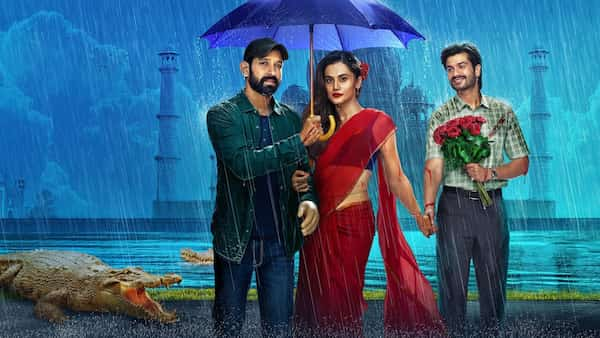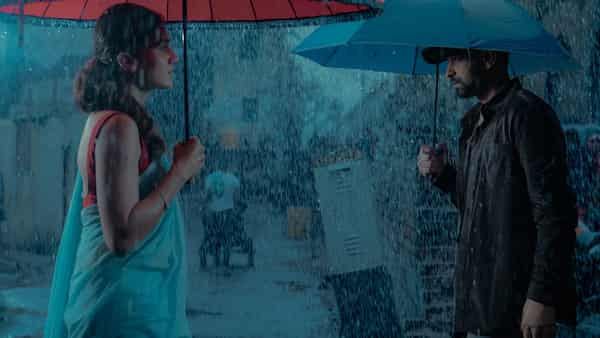Phir Aayi Hasseen Dillruba: The Taapsee Pannu Film Suffers From Clumsy Storytelling
This is #CriticalMargin, where Ishita Sengupta gets contemplative over new Hindi films and shows.

Last Updated: 08.59 PM, Aug 09, 2024
SOME FILMS make others look better, not just in terms of comparison but also in rekindling interest and rediscovering certain merits. In other words, watching one reflects the other’s potential. Phir Aayi Hasseen Dillruba is a good example of this. The Jayprad Desai outing is a sequel to the kitschy Haseen Dillruba, a film so polarising that the reactions overshadowed the reading. When the Taapsee Pannu and Vikrant Massey starrer dropped in 2021, the radicality of it (the aesthetic was borrowed from pulpy Hindi novels, as was the excessive plot design) came across as a tropey mess that shocked because it could. But with the second venture out, in what is clearly turning into a franchise, it becomes evident what worked the first time — and, by extension, what doesn’t this time.
Vinil Mathew’s Haseen Dillruba was a strange beast of a film that shapeshifted as it unfolded. It started off as an oddball template-driven small-town film about the misadventures of a saucy, Delhi-bred woman, Rani Kashyap (Pannu) who comes to the quaint Jwalapur after marriage only to find her husband, Rishu (Massey), to be too timid for her taste. Midway, it morphed into a thriller with a crime of passion thrown in and Rani being pulled up as the suspect. She had an affair with Rishu’s cousin, Neel (Harshvardhan Rane) and her husband, it appears, is dead. But through it all — police procedural, shifting timelines, outlandish revenge subplots — Haseen Dillruba culminated as a swooning romance that committed to its worldbuilding with abandon and fielded our scepticism with uncurbed conviction. Our belief in the twisted love story hinged on our willingness to believe in the unreasonability of love. Can someone cut their hand, like Rishu did for Rani, as a damning proof of love? If one believes so.

In retrospect, Haseen Dillruba showcased more gumption than most Hindi films through its singular dedication to mayhem, aided by the affecting score and performances. Phir Aayi Hasseen Dillruba is a pale reprisal in comparison, that hovers over the fences instead of swinging for them. It inherits the framework of the original but robs off the soul, reducing the outing to a clumsy guessing exercise with no heart.
The action shifts to Agra, a city known for love and madness, and Rishu and Rani have started afresh. She is a widow who works at a beauty parlour. Rishu, with his prosthetic hand, is supposed to be dead to the world. Some years ago, in a moment of heated argument, Rani had accidentally killed Neel and to cover that up, Rishu had passed the accident as his own death. His severed hand with Rani’s name tattooed on it was the evidence. The crime of passion was actually an act of love.
There is a nice rhythm to the initial stretches. Rani, the creature of books and avid reader of Hindi pulpy novels, was disappointed with her staid arranged marriage. In Agra, she gets her story. Rishu and she meet secretly (Massey’s entry scene in the rain, scored to Karz’s Ek Hasina Thi, is one for the books). They watch films sitting apart but with eyes reserved only for each other. She runs to a bridge and he stands, hopelessly. The conventional timeline is turned on its head. They were married first and they became lovers.
Like any self-respecting love story, the stakes are dizzying. As proof, the ACP Kishore Jamwal (Aditya Srivastava), the erstwhile cop from Jwalapur who got invested in the case, makes an appearance. He knew what they did (as they derived the idea from one of Rani’s favourite books) and he is out to convict them. Added to the team is another officer, Mrityunjay Prasad (the ever-watchable Jimmy Sheirgill) who has personal connections to the case. Neel was his nephew and he wants revenge. There is someone else too: a lovelorn compounder Abhimanyu (Sunny Kaushal in a grating turn that is reminiscent of every actor’s portrayal of an anti-hero except his own) who is smitten with Rani for long. To evade the suspicion of the police, Rani gets married to him.

It is easy to see what Phir Aayi Hasseen Dillruba has set its sights on. The Kanika Dhillon film (she is the writer of both the outings) seeks to recreate the triangular mess only for Rani and Rishu to triumph at the end. On paper, it is an intriguing idea that proposes that maybe, for both of them, the only way to sustain their love is through the presence of conflict (or a third person). Hasseen Dillruba indicated it; Desai’s film goes a step ahead and hints at embracing a blazingly adult notion of togetherness that navigates transgression to arrive at companionship. Just how Rani finds Abhimanyu, there is Poonam (Bhumika Dube) for Rishu, his landlady who lost her leg while jumping off a building for her ex-boyfriend. With prospects standing in line, the primary love story is forced to come of age.
But that is the build-up. Not before long, Phir Aayi Hasseen Dillruba comes crashing down under its own potential. The storytelling is revealed to be tropey and Dhillon plays catch-up with her own prior work. The design of a non-linear timeline is repeated and the fire is replaced by crocodiles (the most fake and inadequate ones in the history of Hindi cinema, closely followed by those featured in Ashutosh Gowariker’s Mohenjo Daro). A major mishap is the casting of Kaushal who never really manages to conjure enough charm to be on equal footing with Pannu and Massey, both still as effective. He is posited as a competitor but is never in the competition.
The wheels go off completely in the third act. It is silly, arrogant writing with the makers mistaking frantic twists for pluckiness. There is no logic to the proceedings, there is also little heart to offset prickly reasoning. The last half-hour of the film is designed as a continuous hoodwinking exercise with one poorly staged revelation following another. It is as incredulous as Dhillon crafting her own Marvel multiverse where no one is really dead.
It is a shame because deep down, Phir Aayi Hasseen Dillruba held promise. Consider the specifics. A blue collared man becomes an outlaw for the woman he loves. She loves books and he gifts her a story. Then her favourite author arrives and Desai’s film asks, what happens when the reader finds the writer as the man she loves stands in the wings? The ideal conflict should have been about whether she likes the one who forms words or the one who built them for her. We would have known if Phir Aayi Hasseen Dillruba had not reduced Rani to a footnote in her own story.
The views expressed in this column are those of the author and do not necessarily reflect the official policy or position of OTTplay. The author is solely responsible for any claims arising out of the content of this column.

 Premium
Premium